USB vs. Wireless Barcode Scanners: Navigating Your Choices for Efficiency
2023-11-13 18:28
Barcode scanners are essential in modern business operations. They play a crucial role in inventory management, asset tracking, and transaction processing. In a warehouse inventory count, a mobile barcode scanner tracks goods effortlessly. Similarly, at a convenience store checkout, a cashier uses a USB barcode scanner with precision. Faced with the diverse array of barcode scanners, the question arises: how does one choose between USB and wireless barcode scanners?
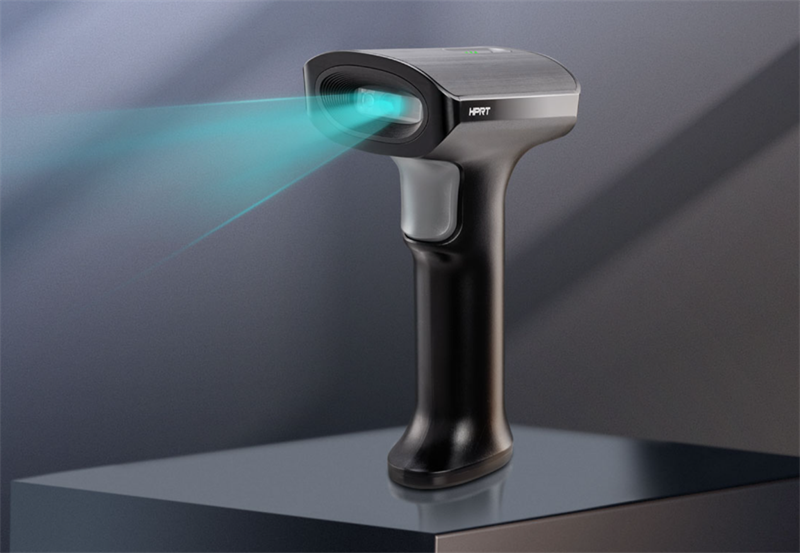
In this comprehensive guide, we'll navigate through the nuances of both scanner types to aid you in making an informed decision that aligns with your operational needs.
Types of Barcode Scanners and Their Functions
Barcode technology has a fundamental role: it turns visual patterns into digital data. Businesses use this data for various tasks, such as managing inventory, tracking assets, and processing transactions.
Generally, based on the mode of connectivity, barcode scanners can be broadly categorized into two types: USB barcode scanners and wireless barcode scanners.
1.USB Barcode Scanners
USB scanners, also known as wired barcode scanners, establish a direct connection to a computer or similar host device via a USB port.
USB barcode scanners are characterized by their ease of use and swift and high-speed data transfer. They require no battery changes or charging, as they draw power directly from the connected device. This plug-and-play approach is particularly well-suited for stationary setups where the scanning distance is minimal, such as checkout counters or library check-in stations.
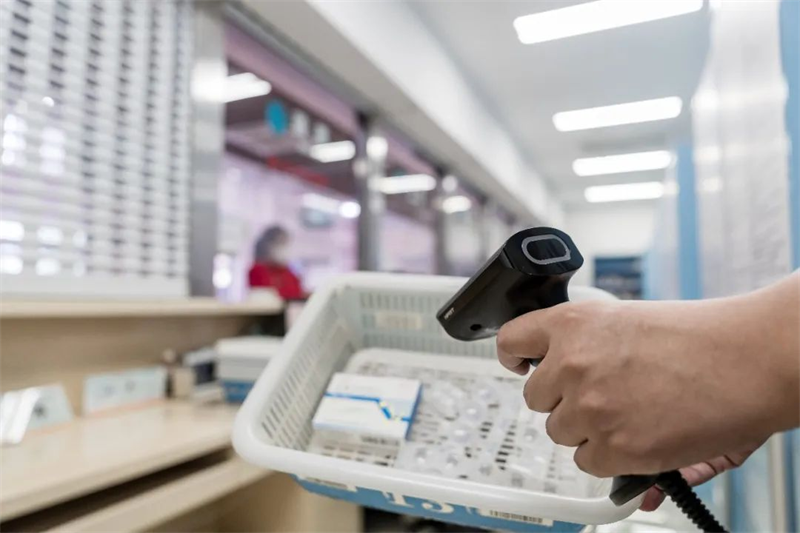
USB barcode scanners quickly transfer data, matching the pace of fast scanning. This is crucial in retail, especially during sales or clearance events, and in pharmacies for dispensing medication. Their speed and consistency keep workflows smooth and uninterrupted.
2.Wireless Barcode Scanners
Conversely, wireless barcode scanners, particularly those utilizing Bluetooth technology, have introduced a new dimension of freedom.
They cut the cord, letting users move and scan with ease. In the vast aisles of warehouses, workers can scan large items in real-time as they handle them, streamlining the inventory process.
On the bustling retail floors, employees update inventory on-the-fly by connecting scanners to tablets or mobile devices, ensuring stock levels are immediately adjusted. In the fast-paced world of logistics, personnel use these scanners to input data into mobile systems, allowing for the precise tracking of goods. And at lively event venues, these mobile devices validate tickets quickly. All of these demonstrate their adaptability and efficiency in various settings.
Standard Bluetooth barcode scanners offer a transmission range of up to 10 meters, but the HPRT mobile barcode scanner N160BT takes it a step further. In open spaces, this scanner boasts an impressive range of up to 100 meters, significantly expanding the boundaries within which businesses can operate. This extended range opens up new possibilities for efficiency in expansive environments such as large warehouses, outdoor sales events, or extensive retail spaces,
Bluetooth barcode scanners stand out for their portability. They can pair with a variety of devices, including iPads, tablets and laptops. The connection process is straightforward, typically involving a simple setup that's quick and easy to complete.
However, they do come with considerations such as ensuring they are charged and managing potential interference with other wireless devices.
Key Considerations for Selecting Between USB and Bluetooth Barcode Scanners
Selecting the perfect barcode scanner for your business involves more than just picking one option over another. It's about finding a solution that resonates with your business's rhythm and requirements. Here, we dissect the key factors that should guide your decision-making process:
1.Range of Movement Required
The physical layout of your workspace can greatly influence your choice.
A USB barcode scanner offers stability and is a perfect fit for compact spaces where products come to the counter, like in small retail shops or fixed registration desks.
In contrast, a Bluetooth barcode scanner excels in environments demanding mobility, such as sprawling warehouse floors or large retail spaces where employees must reach out to scan items on high shelves or across checkout areas. The freedom to move without the constraint of wires can enhance efficiency and reduce the time spent on each scanning task.
2.Frequency and Volume of Scans
Consider the pace at which items need to be scanned. High-traffic scenarios like major retail events, where speed is of the essence, may benefit from the quick, consistent scanning capability of a USB barcode scanner.
However, for tasks that require scanning a large volume of items spread over an area, the portability of a Bluetooth scanner can reduce the time spent moving between products, thus speeding up the overall process.
3.Compatibility with Existing Systems
It's crucial to choose a scanner that integrates seamlessly with your current technological ecosystem.
USB barcode scanners are often seen as a universal solution, readily connecting with most systems. However, Bluetooth barcode scanners have made significant strides in compatibility, especially with the rise of mobile devices in business operations.
HPRT's 2D barcode scanners are widely utilized across various sectors, including warehousing and logistics, healthcare, retail and hospitality, government, and light manufacturing industries. They offer an extensive range of models for both one-dimensional and two-dimensional barcode scanning, featuring multiple connectivity options such as RS-232 serial ports, USB keyboards, USB virtual serial, and Bluetooth connections.
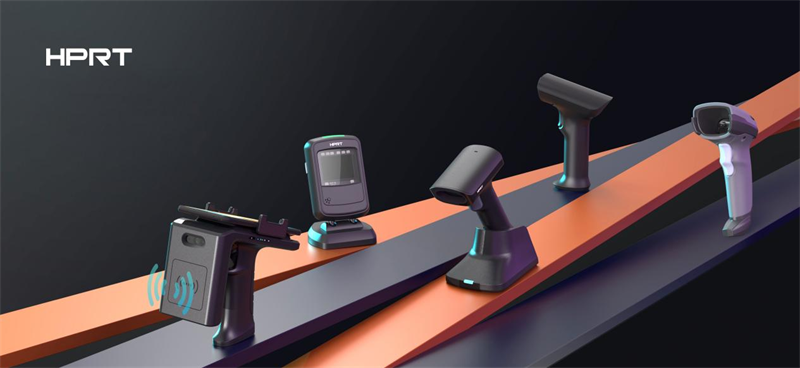
4.Long-term Durability and Support
The operational environment will dictate the durability required of your scanner. Industrial settings with harsh conditions necessitate robust devices that can withstand drops, dust, and moisture.
While both USB and Bluetooth options offer durable designs, the lack of cords on a Bluetooth scanner can reduce wear and tear over time. Additionally, consider the support and warranty services provided.
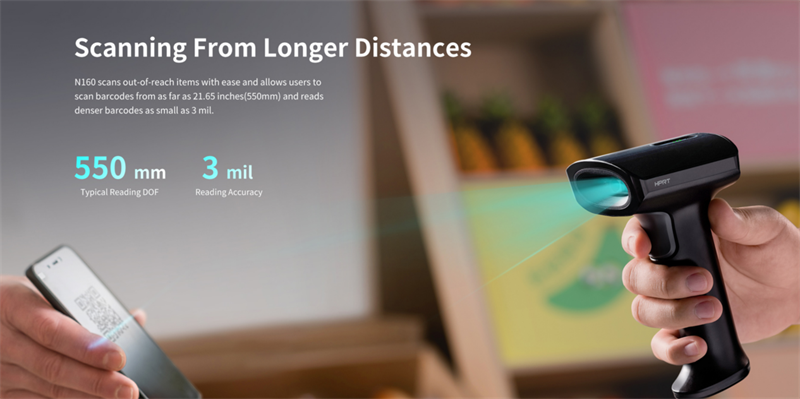
The HPRT N160BT, a high-performance wireless 2d barcode scanner, boasts an extensive depth of field, capturing barcodes from a distance with exceptional accuracy, down to a 3mil resolution.
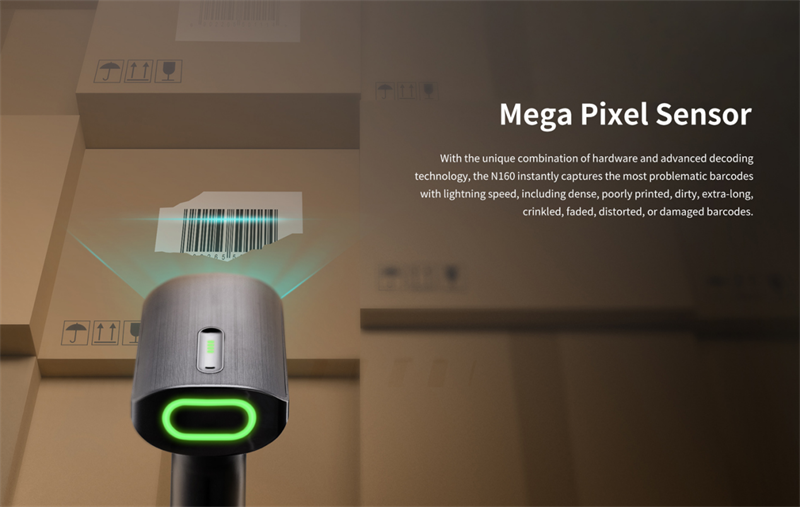
Its advanced automatic decoding technology and superior image recognition capabilities ensure rapid and accurate scanning operations. The N160BT handheld scanner excels at reading barcodes and QR codes, even when they're faded or damaged. It handles a range of surfaces with ease, from paper and soft packaging to electronic screens and laminated labels.
It supports Bluetooth connectivity and compatibility with multiple systems including Windows, iOS, Android, and Linux. Its connection is straightforward, and it supports various keyboard languages, enhancing its versatility across different work settings.
The N160BT's robust integrated structure is engineered for endurance, confidently withstanding drops from heights of up to 1.8 meters. Its ergonomic design, complemented by a top-mounted, easy-to-read battery level indicator, further accentuates the scanner's user-friendly features. The accompanying wireless charging base ensures the device is always powered up, ready for use.
Whether in a bustling retail store or a busy factory workshop, the N160BT wireless 2d barcode scanner delivers stable and efficient scanning performance, meeting stringent work demands and ensuring smooth business operations.
5.Cost-effectiveness and ROI
Budgetary constraints cannot be overlooked. While USB barcode scanners may present a lower upfront cost, the long-term return on investment (ROI) should be evaluated.
Bluetooth barcode scanners can potentially offer greater ROI by boosting productivity through their flexibility and reducing the need for multiple scanners across different locations. Moreover, the time saved in wireless operations can translate into cost savings, making the initial investment in a Bluetooth scanner worthwhile.
The journey to selecting the ideal barcode scanner—whether USB or Bluetooth—should be guided by a clear understanding of your business's unique needs and the operational efficiencies you aim to achieve. As we've explored, each type offers distinct advantages, from the steadfast reliability of USB scanners to the dynamic flexibility of wireless barcode scanner like HPRT's N160BT. Ultimately, making the right choice will enhance the efficiency of your business processes and ensure that your investment yields the maximum return.







